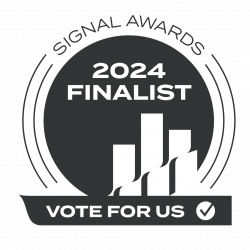We’re thrilled to announce that EFF’s “How to Fix the Internet” podcast is a finalist in the Signal Awards 3rd Annual Listener's Choice competition. Now we need your vote to put us over the top!
We’re barraged by dystopian stories about technology’s impact on our lives and our futures — from tracking-based surveillance capitalism to the dominance of a few large platforms choking innovation to the growing pressure by authoritarian governments to control what we see and say. The landscape can feel bleak. Exposing and articulating these problems is important, but so is envisioning and then building a better future.
That’s where our podcast comes in. Through curious conversations with some of the leading minds in law and technology, “How to Fix the Internet” explores creative solutions to some of today’s biggest tech challenges.
Over our five seasons, we’ve had well-known, mainstream names like Marc Maron to discuss patent trolls, Adam Savage to discuss the rights to tinker and repair, Dave Eggers to discuss when to set technology aside, and U.S. Sen. Ron Wyden, D-OR, to discuss how Congress can foster an internet that benefits everyone. But we’ve also had lesser-known names who do vital, thought-provoking work – Taiwan’s then-Minister of Digital Affairs Audrey Tang discussed seeing democracy as a kind of open-source social technology, Alice Marwick discussed the spread of conspiracy theories and disinformation, Catherine Bracy discussed getting tech companies to support (not exploit) the communities they call home, and Chancey Fleet discussing the need to include people with disabilities in every step of tech development and deployment.
That’s just a taste. If you haven’t checked us out before, listen today to become deeply informed on vital technology issues and join the movement working to build a better technological future.
And if you’ve liked what you’ve heard, please throw us a vote in the Signal Awards competition!
Our deepest thanks to all our brilliant guests, and to the Alfred P. Sloan Foundation's Program in Public Understanding of Science and Technology, without whom this podcast would not be possible.











